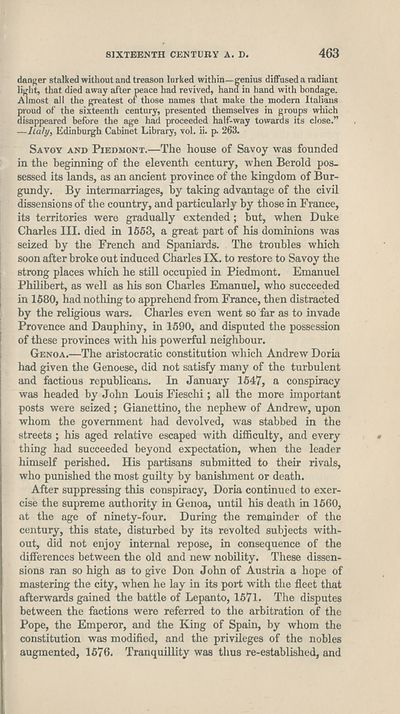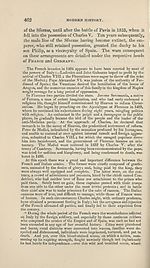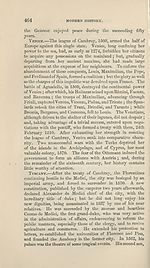Download files
Complete book:
Individual page:
Thumbnail gallery: Grid view | List view

SIXTEENTH CENTURY A. D.
463
danger stalked without and treason lurked within—genius diffused a radiant
light, that died away after peace had revived, hand in hand with bondage.
Almost all the greatest or those names that make the modern Italians
proud of the sixteenth century, presented themselves in groups which
disappeared before the age had proceeded half-way towards its close.”
—Italy, Edinburgh Cabinet Library, vol. ii. p. 263.
Savoy and Piedmont.—The house of Savoy was founded
in the beginning of the eleventh century, when Berold pos¬
sessed its lands, as an ancient province of the kingdom of Bur¬
gundy. By intermarriages, by taking advantage of the civil
dissensions of the country, and particularly by those in France,
its territories were gradually extended; but, when Duke
Charles III. died in 1563, a great part of his dominions was
seized by the French and Spaniards. The troubles which
soon after broke out induced Charles IX. to restore to Savoy the
strong places which he still occupied in Piedmont. Emanuel
Philibert, as well as his son Charles Emanuel, who succeeded
in 1580, had nothing to apprehend from France, then distracted
: by the religious wars. Charles even went so far as to invade
Provence and Dauphiny, in 1590, and disputed the possession
of these provinces with his powerful neighbour.
Genoa.—The aristocratic constitution which Andrew Doria
had given the Genoese, did not satisfy many of the turbulent
and factious republicans. In January 1547, a conspiracy
was headed by John Louis Fieschi; all the more important
posts were seized; Gianettino, the nephew of Andrew, upon
whom the government had devolved, was stabbed in the
streets; his aged relative escaped with difficulty, and every
thing had succeeded beyond expectation, when the leader
himself perished. His partisans submitted to their rivals,
who punished the most guilty by banishment or death.
After suppressing this conspiracy, Doria continued to exer¬
cise the supreme authority in Genoa, until his death in 1560,
at the age of ninety-four. During the remainder of the
century, this state, disturbed by its revolted subjects with¬
out, did not enjoy internal repose, in consequence of the
differences between the old and new nobility. These dissen¬
sions ran so high as to give Don John of Austria a hope of
mastering the city, when he lay in its port with the fleet that
afterwards gained the battle of Lepanto, 1571. The disputes
between the factions were referred to the arbitration of the
Pope, the Emperor, and the King of Spain, by whom the
constitution was modified, and the privileges of the nobles
augmented, 1676. Tranquillity was thus re-established, and
463
danger stalked without and treason lurked within—genius diffused a radiant
light, that died away after peace had revived, hand in hand with bondage.
Almost all the greatest or those names that make the modern Italians
proud of the sixteenth century, presented themselves in groups which
disappeared before the age had proceeded half-way towards its close.”
—Italy, Edinburgh Cabinet Library, vol. ii. p. 263.
Savoy and Piedmont.—The house of Savoy was founded
in the beginning of the eleventh century, when Berold pos¬
sessed its lands, as an ancient province of the kingdom of Bur¬
gundy. By intermarriages, by taking advantage of the civil
dissensions of the country, and particularly by those in France,
its territories were gradually extended; but, when Duke
Charles III. died in 1563, a great part of his dominions was
seized by the French and Spaniards. The troubles which
soon after broke out induced Charles IX. to restore to Savoy the
strong places which he still occupied in Piedmont. Emanuel
Philibert, as well as his son Charles Emanuel, who succeeded
in 1580, had nothing to apprehend from France, then distracted
: by the religious wars. Charles even went so far as to invade
Provence and Dauphiny, in 1590, and disputed the possession
of these provinces with his powerful neighbour.
Genoa.—The aristocratic constitution which Andrew Doria
had given the Genoese, did not satisfy many of the turbulent
and factious republicans. In January 1547, a conspiracy
was headed by John Louis Fieschi; all the more important
posts were seized; Gianettino, the nephew of Andrew, upon
whom the government had devolved, was stabbed in the
streets; his aged relative escaped with difficulty, and every
thing had succeeded beyond expectation, when the leader
himself perished. His partisans submitted to their rivals,
who punished the most guilty by banishment or death.
After suppressing this conspiracy, Doria continued to exer¬
cise the supreme authority in Genoa, until his death in 1560,
at the age of ninety-four. During the remainder of the
century, this state, disturbed by its revolted subjects with¬
out, did not enjoy internal repose, in consequence of the
differences between the old and new nobility. These dissen¬
sions ran so high as to give Don John of Austria a hope of
mastering the city, when he lay in its port with the fleet that
afterwards gained the battle of Lepanto, 1571. The disputes
between the factions were referred to the arbitration of the
Pope, the Emperor, and the King of Spain, by whom the
constitution was modified, and the privileges of the nobles
augmented, 1676. Tranquillity was thus re-established, and
Set display mode to:
![]() Universal Viewer |
Universal Viewer | ![]() Mirador |
Large image | Transcription
Mirador |
Large image | Transcription
| Antiquarian books of Scotland > Education > Elements of universal history on a new and systematic plan > (483) |
|---|
| Permanent URL | https://digital.nls.uk/127585936 |
|---|
| Description | Thousands of printed books from the Antiquarian Books of Scotland collection which dates from 1641 to the 1980s. The collection consists of 14,800 books which were published in Scotland or have a Scottish connection, e.g. through the author, printer or owner. Subjects covered include sport, education, diseases, adventure, occupations, Jacobites, politics and religion. Among the 29 languages represented are English, Gaelic, Italian, French, Russian and Swedish. |
|---|

